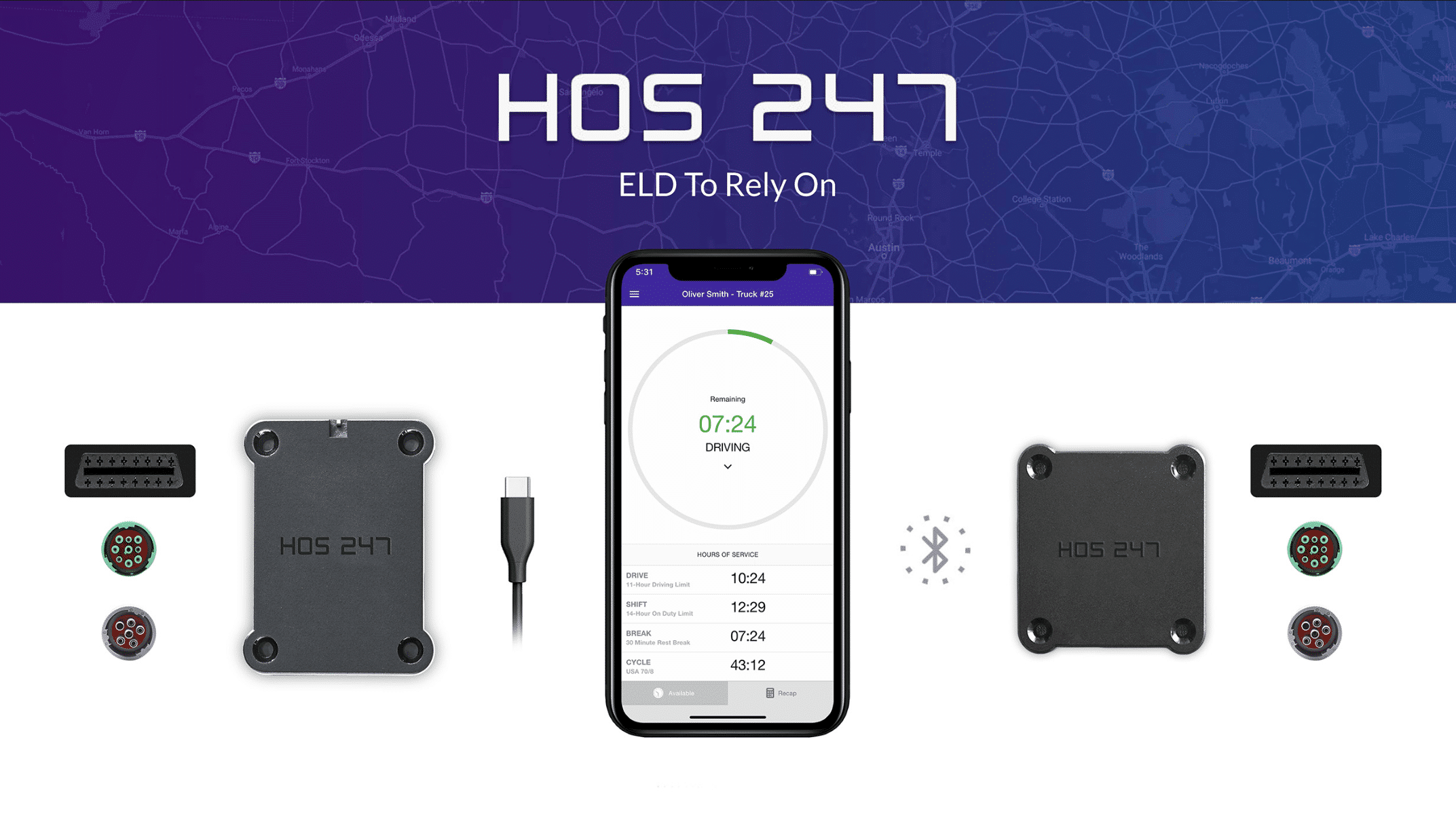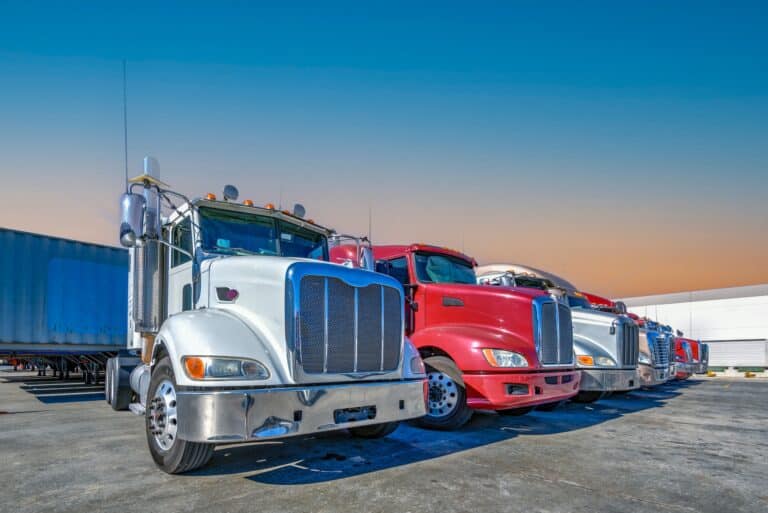Since the ELD mandate’s implementation in 2017, electronic logbooks have become an integral working tool both for CMV drivers and fleet managers. But, what does ELD stand for? ELD stands for electronic logging device. These digital tools must be used by commercial vehicle drivers to keep records of duty status in compliance with FMCSA regulations.
The valuable data collected by electronic logbooks can also be used by fleet managers for workflow optimization. By knowing what ELD is and how it can streamline internal trucking operations, motor carriers can improve their productivity and stay ahead of the competition. In this article, we will delve into some technical and legal aspects of these devices and characteristics of a quality logbook to help you make the right choice for your business.
Do you have any questions? Talk to ELD Advisor: 650-405-3372 or Request Callback
How Do ELDs work?
Electronic logging devices provide a high level of accuracy, recording driving hours directly from the vehicle’s engine via the diagnostics port. They capture data on the operator’s driving time, engine hours, vehicle movement, and location, as well as the driver’s status to calculate the driver’s hours of service.
The collected data is protected through multiple security layers including encryption, secure authentication protocols, and regular security updates. Access controls ensure that sensitive information is only available to authorized personnel, meeting both DOT requirements and data privacy standards.
Modern ELD solutions offer compatibility across various platforms and devices, including iOS and Android systems, tablets, and smartphones. This flexibility allows truckers to choose the hardware that best suits their needs or that they are more comfortable using.
The information is transmitted via Bluetooth or USB to a mobile app that the driver can use to view and manage the information and display it for safety officials during roadside inspections. The mobile app offers a straightforward management of hours of service, vehicle inspections, and documentation. Drivers can handle essential tasks like keeping and managing TODS, completing DVIRs, and generating compliance reports through an intuitive interface designed for use on the road. Fleet managers can access these metrics via the online portal. Using this data, ELDs also provide real-time alerts to drivers when they are approaching HOS limits, helping prevent driver fatigue and increase safety on the road.

Implementation Requirements & Planning
Before installing an electronic logging device, motor carriers need to carefully plan the implementation process. The first step is ensuring your vehicles are compatible with ELD hardware. Most ELDs connect through the engine’s diagnostic port, but specifications vary between vehicle types and manufacturers. Check that the chosen ELD supports your fleet’s specific engine types and model years.
Installation can be completed by the fleet’s maintenance team or professional technicians, depending on the system’s complexity. The process typically involves connecting the device to the diagnostic port, securing any additional sensors, and testing the connection with the mobile app. While installation is straightforward for most vehicles, older models may require additional hardware or adaptors.
Driver training is crucial for successful elog implementation. Drivers need to understand how to log in, record duty status changes, manage their hours of service, and present records during roadside inspections. Plan for initial training sessions and ongoing support as drivers adjust to the new system. Consider designating experienced drivers as mentors to help others during the transition.
Common challenges during implementation include resistance to new technology, connectivity issues in remote areas, and initial delays in operations as staff adapt to the system. Address these proactively by communicating the benefits of electronic logbooks, testing coverage in your operating areas, and allowing extra time for drivers to complete their logs during the learning period.
The timeline from selection to full implementation usually spans 4-8 weeks. This includes hardware procurement, installation scheduling, driver training, and a testing period. Plan your rollout during a slower operational period to minimize disruption.
Budget considerations should account for more than just hardware and subscription costs. Include expenses for installation, training time, potential productivity dips during the learning period, and ongoing support. Many providers offer flexible payment plans to help manage upfront costs while maintaining compliance with federal regulations.
Although all elogs have to fulfill certain requisites, not every device is equally reliable. How can motor carriers know that the solution they are purchasing is dependable? There are several crucial factors to consider when choosing a provider. Read about them in the next section.
Choosing a Dependable ELD Provider
A reliable elog solution can significantly improve compliance with federal regulations related to hours of service and reduce the risk of penalties for non-compliance. In addition, ELDs help fleet managers view driver availability and performance by day, week, and month, to spot trends in violations across the fleet and implement solutions and to provide insight about the shape the fleet is in.
However, the experience of using an electronic logbook may vary significantly depending on the quality of the solution and the provider’s policies. A malfunctioning electronic logging device may considerably slow down trucking operations as the driver will have to suspend their activities to solve the issue and, if the provider doesn’t have efficient customer support, it may take hours to fix the problem. Considering that more than 800 FMCSA-approved providers are available in the market today, looking for the right solution can be an overwhelming task.

To make things worse, the self-certification process required from manufacturers in the US can’t guarantee 100% compliance since the Administration does not verify they actually fulfill all requirements. Besides registration with the FMCSA, there are other important characteristics that distinguish a dependable elog provider. Let’s see what these are:
- Provider’s experience. Look for a company with significant experience in the industry and a proven track record. Look for a provider with experience navigating the technological and legislative complexities of the industry. A reliable provider will offer services to help ensure compliance with ELD regulations.
- Online reviews. Spend time reading unbiased online reviews to find out what other business owners, fleet managers, and drivers think of elog apps. Insightful opinions on the quality of the product, customer service, benefits, and shortcomings of different systems can help truckers find a suitable option. Pay attention to ratings: if other truckers have tried and approved of the logbook, there is a good chance its performance is acceptable.
- Customer support. We have already briefly mentioned that inaccessible technical support can be a reason for downtime, as waiting on the phone for hours trying to solve an issue takes drivers away from performing their tasks. Look for a provider that offers professional technical support available seven days a week with knowledgeable representatives instead of automated messages.
- Pricing. Make sure that the price you are paying is final and includes all services you want to get from your provider. Low-priced solutions may have hidden fees, so customers end up paying more than expected as costs are added for essential services like hardware installation or activation. Before hiring a company, ask about any additional fees or extra costs.
- Trials. If an ELD provider is confident in the quality of its services, it will offer a trial or demo for customers to test its system. A trial will allow truckers to get to know the solution before committing to it to make sure it is the right fit.
Understanding what the ELD is and its benefits can help motor carriers comply with the law and improve productivity. If you are looking for an electronic logging device that combines flexible customer policies with advanced technology, we have a viable option to offer.
Business Benefits & ROI
Electronic logging devices offer significant returns beyond basic compliance. Fleet managers see measurable reductions in fuel costs through improved route planning and reduced idle time. The automated recording of hours of service saves drivers considerable time on paperwork each day, adding up to substantial operational savings across a fleet.
Safety improvements are notable, with users reporting fewer preventable accidents. This reduction in accidents, combined with better HOS compliance, often leads to insurance premium discounts. Some insurance providers offer additional incentives for fleets using advanced ELD features like driver behavior monitoring.
The data collected by electronic logbooks helps optimize fleet operations in several ways. Real-time visibility into vehicle locations and driver availability improves dispatch efficiency and customer service. Carriers can identify underutilized assets and better plan maintenance schedules based on actual engine hours rather than estimated usage.
Analytics from elog data reveal patterns in route efficiency, fuel consumption, and driver performance. Fleet managers can use these insights to make informed decisions about vehicle replacement, driver training needs, and route optimization. Many carriers report significant improvement in asset utilization after implementing data-driven fleet management strategies.
IFTA reporting and other administrative tasks become more accurate and less time-consuming with automated ELD data collection. This automation reduces administrative labor costs while improving compliance accuracy. The system also helps prevent costly violations by ensuring adherence to hours of service regulations.
HOS247 Is a Leading ELD Service Provider

HOS247 is an elog company that fulfills all the characteristics mentioned above. Our electronic logging devices are highly valued by the trucking community for their stable and efficient service. Designed to provide a maximum level of compliance with the FMCSA regulations, the HOS247 solution proved to be dependable and easy to use. Among other characteristics that make us a top-rated provider of elog devices are:
- Compatible hardware. Our device is compatible with different types of vehicles to facilitate installation. It is also made with high-quality materials to avoid breakages and provide a stable Bluetooth connection.
- Easy-to-use software. HOS247 elog has a friendly interface that allows drivers to manage their HOS and produce inspection reports with ease. At the same time, fleet managers access this information via the intuitive fleet management portal.
- One-year warranty. Our hardware is built to last. If the device presents any failures within the first year of use, we will replace it with a new one for free.
- No contracts. We don’t bind our clients with long-term contracts, offering flexible subscription plans instead. Choose a monthly or yearly subscription that can be easily scaled up or down or canceled at any moment.
- Two-week trial. At HOS247, we invite our customers to find out what ELD reliance is by trying out our solution for two weeks before subscribing to our plan. If you are unsatisfied with the system, we will return your money no questions asked.
- Top-rated customer service. At HOS247, we have a customer-centered approach that prioritizes our clients’ satisfaction. With our efficient customer support team available from Monday through Sunday, you will get assistance regarding what is ELD, how to use it, troubleshooting, and compliance. Don’t worry if your call gets disconnected: our support manager will reach out to you immediately so you don’t have to explain your issue twice.
ELD-Related Fines and CSA Scores
To understand why ELD compliance is an issue that has to be handled seriously, let’s examine another side of it: penalties and CSA scores. CSA stands for “compliance, safety, and accountability.” This is the FMCSA program for motor carriers aimed to score them based on investigation results, crash reports, number and severity of safety violations, and roadside inspections. These scores are measured monthly using the Safety Measurement System (SMS), ranked on a percentile scale from 0 to 100, with 100 being the worst. A high score negatively impacts a motor carrier’s reputation, increases insurance premiums, and reduces client trust.
There are 22 ELD-related violations that affect a carrier’s CSA score. Among them are:
- No record of duty status (ELD Required) – 5 points.
- No record of duty status when one is required – 5 points.
- Not using the appropriate method to record hours of service – 5 points.
- Operating with a device that is not registered with FMCSA – 5 points.
Penalties for ELD Violations
In addition to CSA score impacts, ELD-related fines can be substantial. With inflation adjustments made in recent years, current penalties include:
- Falsifying ELD records: Up to $12,135 per day.
- Errors in hours of service recording: Ranging from $1,045 to $7,864.
- ELD-related violations involving hazardous materials: Up to $182,877.
- General penalties for ELD non-compliance: From $338 to $196,992, depending on the severity and frequency of violations.
Some violations may also result in the driver being placed out of service, significantly affecting operations.
Preventing ELD Violations
Carriers can significantly reduce their risk of violations through:
- Regular audits. Conduct weekly reviews of driver logs and supporting documents to catch potential issues early.
- Driver training. Maintain an ongoing training program covering proper ELD use, data transfer procedures, and required documentation.
- System maintenance. Keep ELD software updated and verify device registration status with FMCSA regularly.
- Backup procedures. Establish clear protocols for malfunctions, including the use of paper logs when necessary and proper notification to authorities.
- Documentation. Keep all required ELD documents in vehicles, including user manuals, data transfer instructions, and malfunction procedures.
With HOS247, you won’t have to worry about compliance with the ELD law as our electronic logging device works smoothly, helping you prevent costly HOS violations and keep your CSA score low. What is ELD made by HOS247? It’s a reliable device that will help you improve compliance with federal and state regulations so you can focus on growing your business.
Maintenance and Support
Electronic logging devices require minimal but consistent maintenance to ensure reliable operation. Drivers should verify device connection at the start of each trip and report any connectivity issues immediately. Regular checks of mounting hardware and cable connections prevent common technical problems.
When issues arise, drivers should follow established troubleshooting steps: checking physical connections, restarting devices, and verifying mobile app settings. If basic troubleshooting fails, contact technical support while following FMCSA guidelines for malfunction reporting and backup procedures.
Fleet managers must maintain current documentation, including user manuals, malfunction procedures, and data transfer instructions in all vehicles. Keep training materials updated and readily available for new drivers and refresher courses. Establish clear protocols for reporting and resolving technical issues to minimize downtime.
Advanced Features and Capabilities
Modern ELDs offer integrated GPS tracking that provides dispatchers with real-time vehicle location and detailed route history. For drivers, this means fewer check-in calls and faster assistance when issues arise. The system also simplifies IFTA compliance by automatically tracking state-by-state mileage, eliminating the need for manual trip sheets and reducing audit risks.

Engine diagnostic monitoring alerts both drivers and fleet managers to potential mechanical issues before they cause breakdowns. By catching problems early through fault code detection, drivers avoid unexpected downtime and costly roadside repairs. Maintenance can be scheduled at convenient times and locations, keeping trucks moving efficiently.
Idle time monitoring helps fleet managers identify unnecessary fuel consumption patterns, leading to operational changes that reduce fuel costs and engine wear. For drivers, this data supports better practices without micromanagement, as patterns rather than individual instances guide policy improvements.
These advanced features transform ELDs from simple compliance tools into comprehensive fleet management systems that benefit both carriers and drivers through improved efficiency, reduced paperwork, and proactive maintenance management.
Conclusion
Selecting the right ELD solution is crucial for maintaining compliance while maximizing operational benefits. A reliable provider should offer stable functionality, responsive support, and features that address your fleet’s specific needs. Consider not only the basic compliance requirements but also how advanced features can improve your operations and bottom line. With proper implementation and maintenance, an ELD system becomes a valuable tool for fleet optimization and regulatory compliance.

I’ve co-founded, built and managed several transportation-related businesses. Now, I’m a founder and CEO of HOS247 – an AI Transportation Platform for trucking companies, freight brokers and other logistics operations. We are transitioning old-style operations to technology-advanced logistics entities and help them to grow their businesses. ELDs (electronic logging devices), fleet tracking and management 2.0 combined with AI-powered dispatch tools.












GPS fleet tracking is a monitoring system installed in trucks to provide maximum fleet visibility, allowing motor carriers to manage their vehicles in real time. Using telematics technology, GPS fleet tracking hardware collects vehicle-related data and transmits it into the

Picture this: you’re approaching a weigh station when you notice your ELD screen has gone dark. Your heart rate picks up a bit as you try to restart the device, hoping the logs are still there. Sound familiar? Many drivers

Fleet managers and carriers come across multiple day to day operational tasks, such as vehicle maintenance, tracking assets, supervising, etc. These activities are all vital to the business, so they shouldn’t be a challenge. Real-time GPS fleet tracking can make